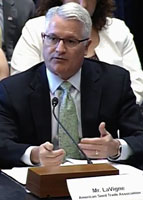The House Agriculture Committee heard testimony Wednesday on technology and innovation in specialty crops as input toward the making of the 2018 farm bill.
“As we look at the farm bill through the lens of the current farm economy, innovation and technology will remain essential for farmers and ranchers to continue producing more food and fiber with fewer resources,” said Committee Chairman Mike Conaway (R-TX).
Among those who testified was American Seed Trade Association (ASTA) President & CEO Andy LaVigne, who stressed that Farm Bill research programs and policies based on sound science are critical to the development of new technologies for plant breeding.“New and evolving innovations like gene editing represent exciting opportunities for agriculture,” said LaVigne. “However, if policies toward breeding methods are overly burdensome, then smaller, regional companies and the public sector will likely be precluded from fully utilizing these innovations.”
LaVigne’s opening statement prompted questioning from committee members that allowed him to elaborate on the potential for gene editing and the importance of educating the public about plant breeding. “We have an uphill road just to talk about the plant breeding methods we use today,” said LaVigne, noting that most people have little or no knowledge of genetics.
Listen to LaVigne’s opening remarks and answers to questions from Reps. Neal Dunn (R-FL) and Austin Scott (R-GA) – ASTA CEO Andy LaVigne testifies at House ag hearing
Other witnesses at the hearing included California Farm Bureau President Paul Wenger; Paul Heller with Wonderful Citrus; Gary Wishnatzki, owner of Wish Farms in Plant City, Florida; and Driscoll’s CEO Kevin Murphy. Listen to their opening remarks and those of Chairman Conaway and Ranking Member Collin Peterson (D-MN) – House Ag Innovation in Specialty Crops Hearing

